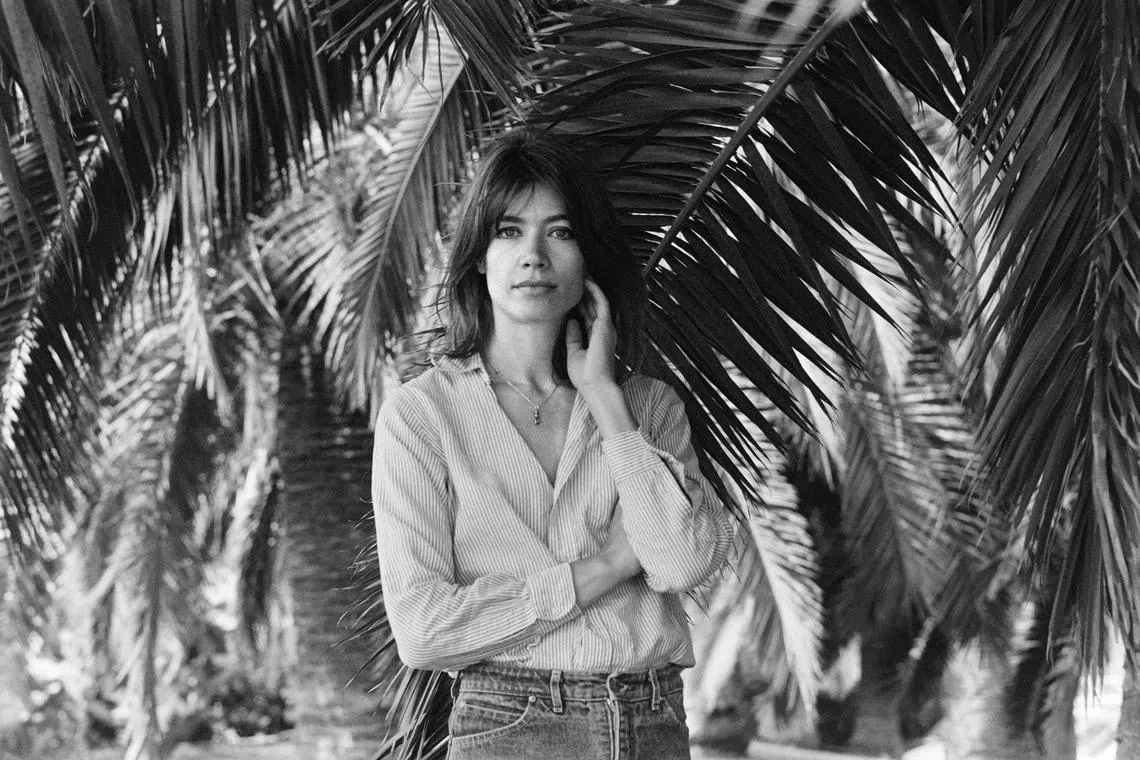French singer and 1960s pop icon Francoise Hardy dies at 80
Sign up now: Get ST's newsletters delivered to your inbox

Francoise Hardy was a reluctant superstar, who dreamed of domestic bliss even as she chalked up chart hits.
PHOTO: AFP
Follow topic:
PARIS – France mourned the loss of a singular voice and a legend of French song on June 12, as the death of Francoise Hardy took one of the last icons of its 1960s heyday.
Hardy’s death at 80, after a long battle with cancer, was announced by her son late on June 11, and commemorations poured in from across France.
Several newspaper headlines used the title of her 1968 hit Comment Te Dire Adieu (How To Say Goodbye).
French Prime Minister Gabriel Attal praised a “singular voice with a fierce tranquillity, Francoise Hardy rocked generations of French people for whom she will remain anchored in moments of their lives”.
Electro pioneer Jean-Michel Jarre recalled “the elegance of her harmonious whispers that will resonate forever in the hearts of boys and girls of all ages”.
That was a nod to another hit, Tous Les Garcons Et Les Filles (All The Boys And Girls), which sold two million copies in 1962 when she had just turned 18 – and which Hardy composed herself, a rarity at the time.
In the carefree 1960s, her melancholy vibe stood out, with a restraint that contrasted with the exuberant style of French screen goddess Brigitte Bardot.
Bardot, now 89, said she was “overwhelmed” by news of Hardy’s death.
“France has lost with her a little of that nobility, that beauty and that luminous talent, of that elegance that she conveyed all along her life,” said Bardot in a statement.
Hardy’s career spanned more than 50 years and almost 30 studio albums, including several film and theatre roles.
But she was a reluctant superstar who dreamt of domestic bliss even as she chalked up chart hits.
It began in 1962 with the catchy debut single Tous Les Garcons Et Les Filles, in which the shy singer-songwriter lamented her loveless status.
“All the boys and girls my age walk hand in hand in the streets two by two... but not me, I walk alone through the streets, my heart aching,” she sang wistfully.
The single sold a million copies, making Hardy an instant star of the “ye-ye” (after The Beatles’ “yeah, yeah, yeah”) generation of post-war French pop singers.
Soon, a parallel career as a cover girl beckoned, with the singer’s thick fringe, sculpted cheekbones and bohemian style coming to define a sort of effortless French chic.
She was an early adopter of the mini-skirt and became a model for fashion designers, including Yves Saint Laurent and Paco Rabanne.
American singer Bob Dylan was among those bowled over by the singer’s languid vocals.
On the cover of his Another Side album in 1964, he wrote a poem starting: “For Francoise Hardy/At the Seine’s edge/A giant shadow/Of Notre-Dame.”
But Hardy had eyes only for fellow “ye-ye” star, the suave and sardonic Jacques Dutronc.
The pair married and had a son Thomas, who also became a musician. But Dutronc, an inveterate womaniser, was an elusive figure who jealously guarded his independence.
“From the moment we met, Jacques created distance between us,” Hardy told French newspaper Liberation in an interview.
The pair, who separated in the late 1980s, were a study in contrasts.
Dutronc was a natural performer, but Hardy, who was studying German at university when she shot to fame, appeared ill at ease on stage.
“Singing is not something that comes easily to me,” Hardy, who thought of herself as a melody-maker first and foremost, told the French-German Arte channel in a documentary.
Dutronc penned one of Hardy’s hits, the 1962 Le Temps De L’amour (It’s The Time Of Love), which American director Wes Anderson revived for a new generation in his 2012 movie Moonrise Kingdom.
Hardy was born in Nazi-occupied Paris in 1944 to a single mother, who was separated from the father of her two daughters.
Her grandmother told her she was “hideous” and would never find a match.
It was only when, years later, Rolling Stones frontman Mick Jagger declared that he had a crush on her that she realised that she was not the “young, naive, unattractive girl” she had been led to believe.
Before Dutronc, she was in a relationship with French photographer Jean-Marie Perier.
In 2004, she was diagnosed with lymphoma, and in 2019 revealed she had throat cancer and had received 45 rounds of radiotherapy.
In a radio interview in 2021, Hardy, who had lost hearing in one ear, backed a bill on euthanasia. “At a certain point, when there is far too much pain and no hope, you have to end the suffering,” she said.
Hardy was the only French artiste to appear in a 2023 ranking of the 200 greatest singers of all time published by Rolling Stone magazine.
At the time, the publication said her 1969 cover of Leonard Cohen’s Suzanne might be “the most evocative ever recorded, his included”.
In addition to her native French, Hardy also sang in English, Italian and German. AFP

